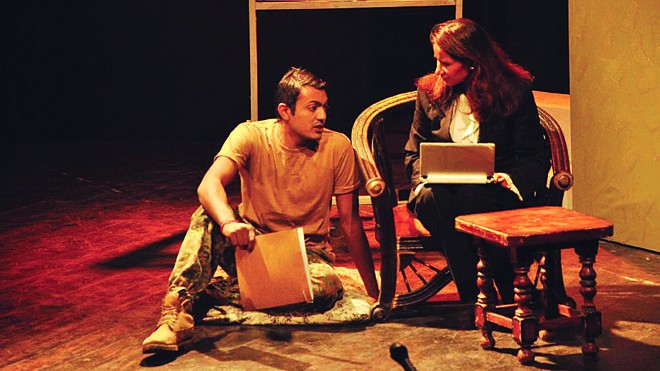

The recent production Cover Up by Azad Theatre at the Alhamra in Lahore was based on a script developed from a writing workshop conducted by them. In the process of mounting 12 productions in the two years of their existence, a dire need must have been felt by them of the lack of original scripts in Urdu and Punjabi -- the two languages this group has staged plays in.
As it is, there is a paucity of original scripts for stage in almost all languages, Urdu, Punjabi, English, Sindhi, Pashto, Balochi. Being relatively more prolific with better output in terms of quality, many in the narrative form of the afsana and the novel have been converted or adapted for productions on stage.
This matter of normal transfer does not raise many eyebrows; rather many think there is no loss of quality. Actually these adaptations have been appreciated more, for it is easier to grasp the play on stage than to go through the rigours of reading a novel or a short story. One way of making quality literary work more accessible is to adapt and present it on stage as a play.
There certainly is a loss of quality in this transfer because the artistic requirements of the stage and the written word are different but these are usually overlooked as there is not much to fallback on. To avoid this loss of quality and initiate a process that may bring greater understanding of the medium, Azad Theatre conduct a workshop for writing stage plays. It appears that in terms of the number of entries, it was quite encouraging and by sifting, editing, and developing one play was made out of the raw script of Sibghat Wyne and finally selected for production at the conclusion of the workshop.
Cover Up staged last week at the Alhamra, by the team that has become synonymous with the group since its inception, was an outcome of this exercise.
The theme of the play was violence as it has become a potent instrument of politics in recent times. Either it is war, where one state is pitched against another or there are warring groups within the country. The play was situated in Iraq which is still going through the horrors of such circumstances but the similarities with the conditions in Pakistan were obvious.
Violence is now the reality that hits you in the face in our country. If there is one dominant theme, it is violence, the way it is working out, its causes and its effectiveness and then the dark shadows that it is casting on the social and cultural fronts in the society. With such endemic violence, one wonders why more of it is not depicted on screen and stage but then there are ways of bringing forth the theme.
Being presented directly on stage or screen can be one way and a potent one, but to see how it is affecting the society can be done in many indirect ways as well. Cover Up chose to show violence only partially on stage and was based more on how it was affecting people directly involved in it.
The two sets of people were pitched against each other -- the locals led by their leaders who were fighting for their freedom based on the inalienable right to make choices in their own country and the occupiers who are more obsessed with bringing peace and ushering in a phase of development. The two positions did not coincide and the result was a clash -- not only of values but of political preferences. There was another set of people who were not directly involved but took advantage of the precarious and uncertain situation to further their own agenda.
And this clash took its own toll in terms of loss of innocent lives; many of whom, women and children, became the casualties of collateral damage, torture and unlawful detention. The division was not black and white as there were a few characters who were weighing options from within the oppressors of speaking out against all this. But their dissent did not take an effective form, to change the course of tragic events.
Similarly, the resolve of those waging a struggle was also on the point of breaking down under pressure from their own families who faced the brunt of atrocities.
But there is limitation of showing violence on stage. It cannot be shown the way it is done in films because of the nature of the medium and also the lack of resources. It is more feasible to show the effects that violence has on the lives of those who have chosen to be in the frontline of the struggle or resistance.
Malik Aslam, the director of the play, kept the production very stark so as to create an ambience of doom and gloom. The sets were minimal, at best suggestive, and the lighting too was used effectively to bring forth the extreme tension embedded in the situation. The core group of the Azad Theatre was fully involved in acting and these were Sarfaraz Ansari, Usman Zia, Naseem Abbas, Alvina Khan, Zohaib Haider, Muhammed Waseem and Nadeem Abbasi.